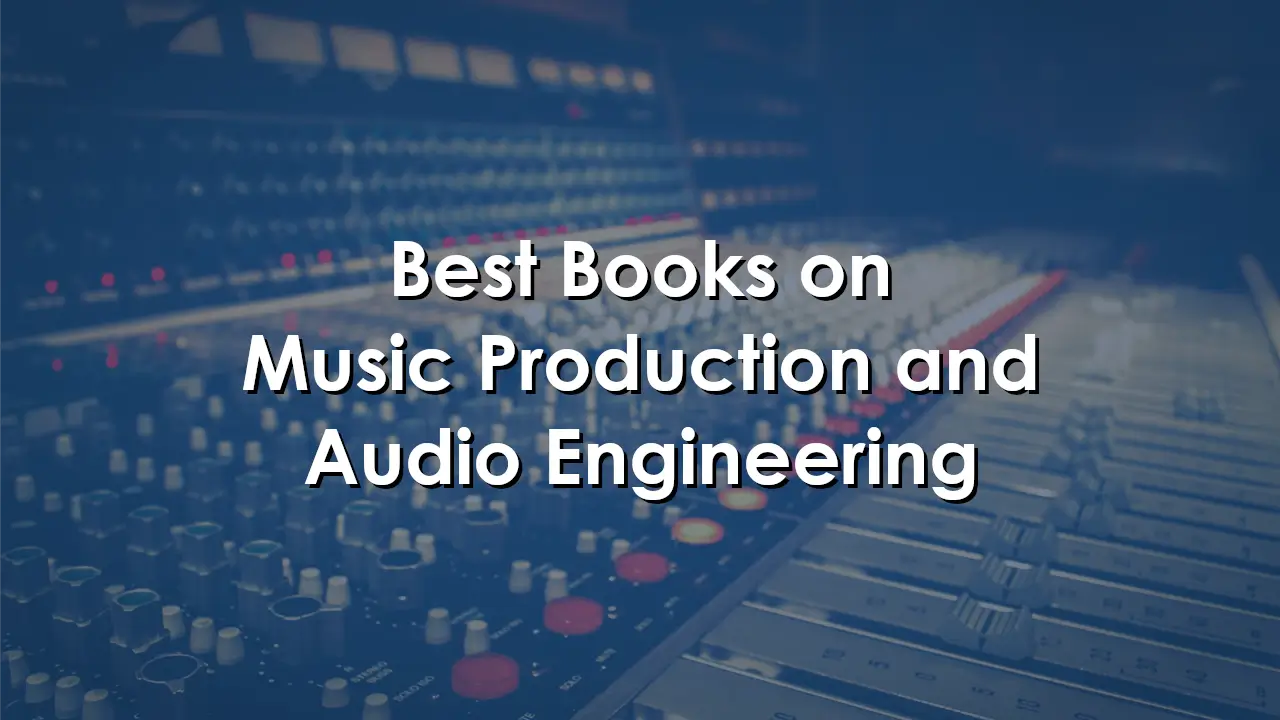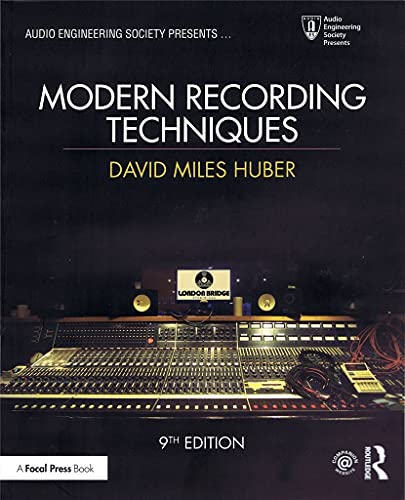What do you need to know as a

The free tutorials and articles from Learning
Music production and audio engineering are about so much more than what most people assume. It is a complex world where multiple fields of
As a
There are many
To make this list easier for you to navigate and read, I have divided the
Top Picks
Music Production: Mixing and Mastering Books
1. Mixing Secrets for the Small Studio by Mike Senior
Mixing Secrets by Mike Senior is as complete as it gets when it comes to learning how to mix. This is the ultimate resource for students who are just starting to learn how to mix
Mixing Secrets for the Small Studio is the best-selling primer for small-studio enthusiasts who want chart-ready sonics in a hurry. Drawing on the back-room strategies of more than 160 famous names, this entertaining and down-to-earth guide leads you step-by-step through the entire mixing process. On the way, you’ll unravel the mysteries of every type of mix processing, from simple EQ and compression to advanced spectral dynamics and “fairy dust” effects. User-friendly explanations introduce technical concepts on a strictly need-to-know basis, while chapter summaries and assignments are perfect for school and college use.
2. Mixing Audio by Roey Izhaki
The book ‘Mixing Audio’ by Roey Izhaki is an absolute must-have book! It has so many great tips and techniques that will teach you all about mixing
Mixing Audio: Concepts, Practices, and Tools, Third Edition is a vital read for anyone wanting to succeed in the field of mixing. This book covers the entire mixing process – from fundamental concepts to advanced techniques. Packed full of photos, graphs, diagrams, and audio samples, it teaches the importance of a mixing vision, how to craft and evaluate your mix, and then take it a step further. The book describes the theory, the tools used, and how these are put into practice while creating mixes.
3. Mastering Audio: The Art and the Science by Bob Katz
This book is as complete as it gets. And what I like is that it is practical and not too long of a read. If you want to become better at
Become a master of audio. This bestselling book has shown thousands of mixing and mastering engineers, musicians, A&R producers how to create great sound. It fully integrates technical with artistic and is ideal for students and working professionals. Mastering Audio is your complete reference: don’t leave the studio without it!
4. Audio Production and Critical Listening by Jason Corey
Together with the online tools that are available, I find this to be a very solid book. So if you want to really develop critical listening skills and knowledge about production mixing then you should read it. It’s a bit of a tough read so you cannot read it on the fly like Mixing Audio by Roey Izhaki or Mixing Secrets by Mike Senior. Nevertheless, it is a valuable resource for people who want to learn all aspects of audio engineering. Here is a short description:
Audio Production and Critical Listening: Technical Ear Training, Second Edition develops your critical and expert listening skills, enabling you to listen to audio like an award-winning engineer. Featuring an accessible writing style, this new edition includes information on objective measurements of sound, technical descriptions of signal processing, and their relationships to subjective impressions of sound. It also includes information on hearing conservation, ear plugs, and listening levels, as well as bias in the listening process.
The interactive web browser-based “ear training” software practice modules provide experience in identifying various types of signal processes and manipulations. Working alongside the clear and detailed explanations in the book, this software completes the learning package that will help you train your ears to listen and really “hear” your recordings.
Recording and Audio Engineering
5. Recording Secrets for the Small Studio by Mike Senior
Being able to record your songs and
Especially for all the musicians, songwriters, composers, and producers who make
Recording Secrets for the Small Studio is based on the backroom strategies of more than 250 famous names. This thorough and down-to-earth guide leads you through a logical sequence of practical tasks to build your live-room skills progressively from the ground up, with user-friendly explanations that introduce technical concepts on a strictly need-to-know basis. On the way, you’ll unravel the mysteries of many specialist studio tactics and gain the confidence to tackle a full range of real-world recording situations.
Specifically designed for small-studio enthusiasts, this book provides an intensive training course for those who want a fast track to releasing quality results, while the chapter summaries, assignments, and extensive online resources are perfect for school and college use.
6. The Recording Engineer’s Handbook by Bobby Owsinski
Some things that I found missing in other books were clear pictures of multiple different recording techniques. And that is exactly what I found in this book. Bobby Owsinski has written many books about
If you want to record an acoustic guitar but don’t know how? Just look it up. Want to record voiceovers? Just go to the pages where everything about voiceovers is explained. I really love this book. It’s easy to read and navigate. A superb
The Recording Engineer’s Handbook by Bobby Owsinski has become a
7. Modern Recording Techniques by David Miles Huber
If you are looking for one of the most complete books on
Here is a short description:
Modern Recording Techniques is the bestselling, authoritative guide to sound and
Using its familiar and accessible writing style, this ninth edition has been fully updated, presenting the latest production technologies and includes in-depth coverage of the DAW, networked audio, MIDI, signal processing and much more.
Music Theory and Songwriting
As a
8. Great Songwriting Techniques by Jack Perricone
This is hands down the best book a songwriter could read. The first time I picked up this book I was amazed by how clearly everything was explained. Practically any topic ranging from writing melodies to amazing chord progressions is covered. Jack Perricone has delivered a masterpiece and if you only buy one book from this list, then let it be this one. This will be one of the only songwriting books for
Perricone teaches readers with a targeted series of lessons on key elements of songwriting from building blocks like melody, harmony, and rhythm to more advanced topics like lyric placement and tone texture. Chapters explore loop-based harmonic patterns, tone tendencies, form, function, and lyric writing, all in service of preparing the aspiring songwriter to be a master of prosody and keen in
understanding the relationship between words and
9. Chord Progressions For Songwriters by Richard Scott
If you want to dive into chord progressions. Then here you go! Chord Progressions For Songwriters by Richard Scott is an amazing resource. There is enough to explore for an entire songwriting career. And I should not forget to mention that you will find chord progressions that will inspire you greatly. All in all this book is a creativity bomb. Here is the short description:
Each chapter of Chord Progressions For Songwriters provides a comprehensive self-contained lesson on one of twenty-one popular chord progressions that every songwriter should know inside and out. Lessons cover ascending, basic (I-IV), blues, circle (VI-II-V-I), classic rock (I-bVII-IV), combination, descending, doo-wop (I-VIm-IV-V), ending, flamenco (Im-bVII-bVI-V), folk (I-V), introduction, jazz (IIm-V-I), minor blues, one-chord, pedal point, rock and roll (I-IV-V), standard (I-VIm-IIm-V), and turnaround progressions as well as rhythm and Coltrane changes.
Songwriting Tutorials
If you want to learn more creative songwriting techniques and hear them in action then check out my video tutorial playlist called: Songwriting Tips & Music Theory for Composing Music. Or check out all the educational music videos and articles on this site.
Music Industry: Marketing and Productivity
10. How To Make It in the New Music Business by Ari Herstand
For me, this book was a revelation. And I think I have read it three times already. Strictly it is not really like any of the books about
If you ever thought that you only need to know the creative and technical things then you are definitely wrong. Today’s
How to Make It in the New
11. Essentialism: The Disciplined Pursuit of Less by Greg McKeown
Essentialism by Greg McKeown is one of those books that makes sense from the beginning. Nowadays we just want to do everything at the same time. Multitasking is hip and buzzing. But does that really work? Learn how to do more by doing less. Here is a short description:
Essentialism is more than a time-management strategy or a productivity technique. It is a systematic discipline for discerning what is absolutely essential, and then eliminating everything that is not, so we can make the highest possible contribution toward the things that really matter.
Biographies and Books About Music Producers
12. Here, There and Everywhere: My Life Recording the Music of the Beatles by Geoff Emerick
Not only fun for Beatles fans! This book gives you a very juicy, fun and inspirational insight into the recording process of the biggest band in the world. Apart from being a very interesting and entertaining read, this book is full of
An all-access, firsthand account of the life and
Geoff Emerick became an assistant engineer at the legendary Abbey Road Studios in 1962 at age fifteen and was present as a new band called the Beatles recorded their first songs. He later worked with the Beatles as they recorded their singles “She Loves You” and “I Want to Hold Your Hand,” the songs that would propel them to international superstardom. In 1964 he would witness the transformation of this young and playful group from Liverpool into professional, polished musicians as they put to tape classic songs such as “Eight Days A Week” and “I Feel Fine.”
Then, in 1966, at age nineteen, Geoff Emerick became the Beatles’ chief engineer, the man responsible for their distinctive sound as they recorded the classic album Revolver, in which they pioneered innovative recording techniques that changed the course of rock history. Emerick would also engineer the monumental Sgt. Pepper and Abbey Road albums are considered by many the greatest rock recordings of all time.
In Here, There and Everywhere he reveals the creative process of the band in the studio and describes how he achieved the sounds on their most famous songs.
13. The Creative Act: A Way of Being by Rick Ruben
Rick Ruben. Do I need to say more? For anybody interested in
Many famed
Over the years, as he has thought deeply about where creativity comes from and where it doesn’t, he has learned that being an artist isn’t about your specific output, it’s about your relationship to the world. Creativity has a place in everyone’s life, and everyone can make that place larger. In fact, there are a few more important responsibilities.
The Creative Act is a beautiful and generous course of study that illuminates the path of the artist as a road we all can follow. It distils the wisdom gleaned from a lifetime’s work into a luminous reading experience that puts the power to create moments—and lifetimes—of exhilaration and transcendence within closer reach for all of us.
Your Support Matters
Support new videos by becoming a member and receive benefits in return. Or by giving a one-time donation! Help me provide free
https://www.buymeacoffee.com/musicskills
















